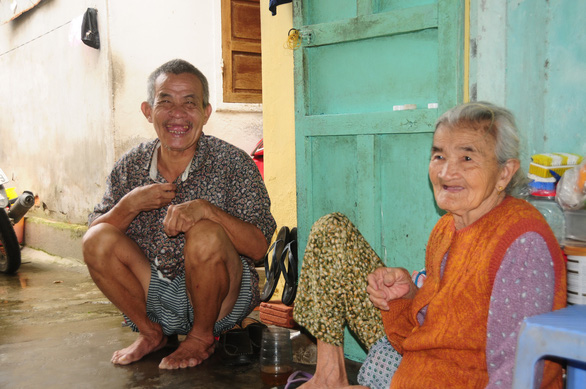Quoc, 62, starts his work day early in the morning, with his footsteps followed by splashing sounds of water being the first thing heard on the street of Tran Hung Dao.
He fills up the bucket at Ba Le Well, a known tourism destination that also serves as the source for water used in cao lau, mi Quang, and other famous dishes in eateries across Hoi An, located in Quang Nam Province.
The well made a career for Quoc’s father Nguyen Duong, who was recognized by the Vietnam Record Association as the man who worked as a water fetcher for the longest time in the Southeast Asian country.
Family business
Over a few decades, Duong made a name for himself as an early bird refilling the water containers for households in Hoi An.
His daily routine ultimately came to a halt when he passed away in 2019.
Although he was not a rich man, he was mourned by thousands of local residents who came out and attended his funeral.
According to them, Duong, the last-standing water vendor who put in earnest work for the community had become a staple figure representing the spirit of Hoi An.
No one expected his legacy to be continued – until Quoc stepped up.
Quoc is living with his 92-year-old mother Nguyen Thi My in an eight-square-meter shack on Tran Hung Dao Street in downtown Hoi An, said his cousin Nguyen Bi.
According to Bi, Quoc used to work as an apprentice for his dad.
Because he is known as an ill-tempered man, Quoc surprised many with his decision to take over the taxing job from his father.
Over a few months, Quoc proved himself to be qualified for the job, even reaching the same level of dedication and finesse as his father.
The people of the town were initially skeptical of his commitment, as he is often seen starting a work day with an overtly bubbly manner, whistling and laughing “as if it’s child’s play.”
They did not hire him at first, but Quoc remained steadfast, filling their tanks with fresh, filtered well water as his father had done for decades.
Only then did the community embrace Quoc’s service and accept him as the successor of the late Nguyen Duong.
|
|
| Nguyen Quoc and his mother are seen at their house in Hoi An City, Quang Nam Province, Vietnam. Photo: T.B.D. / Tuoi Tre |
Old habits die hard
As a booming tourism destination of Vietnam, Hoi An City is well catered with alternative sources of bottled, purified, and running water.
However, old habits die hard — water from Ba Le Well remains the go-to choice of local residents for cooking and drinking to this day.
“After settling and boiling processes, the [Ba Le] water is the key ingredient to make the well-rounded taste mi Quang and cao lau pop. Any other kind of water won’t cut it,” Nguyen Thi Suong, a mi Quang vendor on Hoi An’s Le Loi Street revealed.
According to Nguyen Bi, there are dozens of Hoi An households and restaurants who use water from Quoc’s service on a daily basis.
Quoc is paid at least VND10,000 (43 U.S. cents) for a full load of water from Ba Le Well to the customer’s place.
He usually collects the dues on a monthly basis, but barely ever counts the stack of cash he receives.
“Everyone in the neighborhood is fond of him,” Bi said.
“Each freight is priced at VND10,000, but people often give him twice, even triple the amount.
“Some tourists often ask to take pictures with him and pay him a small sum in return.
“Local vendors at the market usually give him stuff for free.”
Ngo Thi Minh Trang, a resident of an ancient house at 114 Nguyen Thai Hoc in Hoi An, is a long-time customer of the Nguyen family’s service.
After receiving well water and a big smile from Quoc, she gave him VND20,000, twice the settled amount.
“We have been using water from Ba Le Well over the last few decades thanks to the service of Duong and his son. We only use it to cook, drink, and make cao lau,” Trang said.
“The demand for water from Ba Le Well has always been high in Hoi An Ancient Town, as it is the spring that has nurtured us through generations.”
Like us on Facebook or follow us on Twitter to get the latest news about Vietnam!




